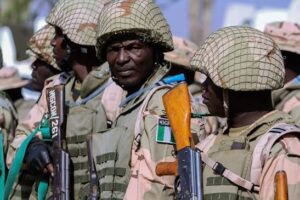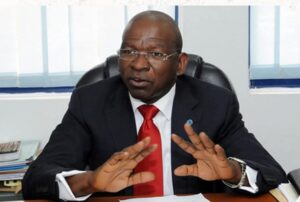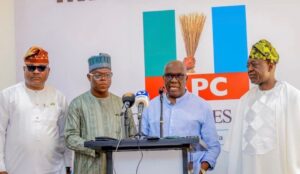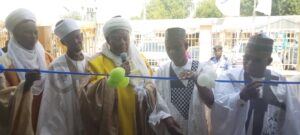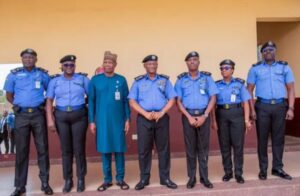The motley traducers of Vice President Yemi Osinbajo fit into a familiar mould. Once the dance of political succession nears the arena, ambition and desperate opportunism drive gladiators and the dark knights at the corridors of power to take aim at likely opponents and prominent obstacles to clear the way ahead of the actual battles. Quite unfortunately, at a point when a new administration ought to be gathering the momentum to serve Nigerians, the nation’s political platform is fast degenerating into a stampede of desperate gladiators. So early in the day, the political landscape is being overrun by 2023 succession merchants and their paid agents.
Quite tragically, the first shots are aimed at vice president Yemi Osinbajo. Perhaps unwittingly, those targeting Mr. Osinbajo are aiming a poisoned arrow at the very heart of President Buhari’s troubled presidency. How else can we visit the sudden eruption of a mischievous vilification campaign against a fundamentally good man like the vice president by the dark knights that perennially prowl the crevices and corridors of Abuja power?
The immediate devices and reasons being touted as justification for this choreographed harassment campaign are largely incoherent.
The setting up of an Economic Advisory Council ostensibly by the president ought to pass unnoticed as a minor episode in the normal exercise of the prerogative of presidential powers. This should have nothing to do with the constitutional role profile of the vice president. Without overtly tampering with the constitutional roles of the vice president, the plot seems to aim at paralysing his office by slicing away those activities that have so far endeared him and the administration to the public. The plot has quickly gone a step further by aiming barbs at the man’s integrity and moral credibility by calling to question the book keeping in major national assignments hitherto handled by his office.
Political hirelings and jobless hacks have been commissioned to fling ridiculous allegations bordering on impropriety at Mr. Osinbajo. The objects range from campaign funding to transparency in the running of the various social intervention programmes domiciled in the vice presidents’s office. This is where the alarm bells need to go off quickly.
A deliberate attack on a branch of the presidency is an attack on the very institution on which our national cohesion and security hinges. By whatever means, a deliberate attempt to undermine the Buhari presidency by taking aim at his very able and credible deputy is an excursion into anarchy. A plot that aims at degrading the integrity and coherence of the Presidency as our prime political institution of state is ultimately a plot against this administration and indeed the nation itself irrespective of the proximity of its authors to the apex domain of power.
The series of nasty speculations around the VP constitute first and foremost an affront and insolent assault on the presidency as an institution. The presidency lies at the centre of our prospects for democratic actualization. When power mongers chisel away at the integrity and coherence of the presidency and its incumbents, they are dangerously eroding the institution and the prospects of democratic stability. Respect for institutions remains the bedrock of a credible democracy. Our tragedy as a nation has remained the casual shredding of vital institutions of state and their conversion into extensions of private oligarchies. If we carry the destructive lack of respect for institutions to the presidency, we may wake up and find there is no nation left to fight over. This is why the president and all people of goodwill who wish this country well ought to rally now to save the Buhari presidency from the assault of dark knights of the realm.
In many ways, however, Osinbajo’s current travails were foretold. The presidential system inherently profiles a Vice President’s role and limitations. The ideal choices are usually inert, faceless and politically nondescript characters. The standard role of a Vice President is to deliver condolence messages, attend funerals, grace weddings of partisan wonks and generally be absent in those places where the president insists on being present.
In the US tradition that we are aping so poorly, some vice presidents have however escaped this charmed cycle of anonymity and political castration.
These are the few who have risen to prominence by deploying their strengths and special skills to add value to the ticket they hold with their principals to public acclaim. While the best vice presidents avoid the political terrain of their principals, such deputies strive at best for ‘relevant anonymity’. Some of the most outstanding names in this tradition include some of the best vice presidents in US history to date as well: Harry Truman, Lyndon Johnson, Walter Mondale and Al Gore are worthy names in this mould. These are men who stood out to strengthen their bosses with their individual abilities thus earning credits for their respective administrations.
In our brief encounter with democracy , however, the office of vice president is first and foremost one of political convenience mostly filled by calculations of compromise. It has become for us an instrument for strategic balancing of geo politics, diversity, faiths, strengths and weaknesses. Our presidents have tended to see their deputies more as ‘spare tyres’ than active partakers in the prime slot of national power.
By the nature of these things, however, a Vice President who is self assured, confident, eloquent and eager to be seen delivering results must always be in search of an alternative job. Even worse, a vice president who consciously cultivates a political following or is seen as potentially politically significant is bound to run into stormy waters. Ask Mr. Atiku Abubakar about his experience as president Obasanjo’s deputy during their second term.
Yemi Osinbajo is in a somewhat different place. He was never quite your archetypal vice presidential material. He has towering academic credentials in a discipline that questions all things. He may not have been overtly political but is variously surrounded by the politics of geo politics in Nigeria’s murky and fractious political culture. The bigger politics around Mr. Osinbajo’s position is ‘the politics of the church in politics’ which is by no means a simple matter in these parts. It is designed to balance out the gravity of ‘the mosque in politics’.
In many respects then, Yemi Osinbajo as Vice President has always been implicitly a marked man. His existential conundrum has always been simply this: how to be an effective political deputy without being overtly political. Although a card carrying APC man, the quorum of his party’s power moguls is likely to be complete without him in attendance.
Ordinarily, his pairing with Mr. Buhari was an ideal balancing act. It is not just in the familiar Moslem/Christian or North/South bipolarity of their ticket. Those are good and almost axiomatic. In terms of effective governance, the pairing is a fitting and realistic mix for the Buhari presidency. While Mr. Buhari brings his cultic mostly Northern muslim mob followership to garner the votes, Mr. Osinbajo comes along with a Christian Pentecostal followership, a South Western cheer leading crowd and an intellectual depth that no government in today’s world can afford to do without.
For all his permissible flaws, President Buhari remains a symbol of power, authority and even some moral strength to many Nigerians. But yet, most young Nigerians see him as something of the old school conservatism that his generation has burdened the nation with. He is not the type that you expect to don a pair of jeans and sneakers or snap open a lap top and spring a solution in power point. Buhari is however keenly aware of the ultimate national good and feels a commitment to its pursuit and achievement. Buhari and his generation are nostalgic about a forgotten Nigerian past, the era of groundnut pyramids, cocoa farms and palm oil plantations.
On the contrary, Osinbajo is the face of contemporary Nigerian modernity, of the kind of enlightened governance that will spew statistics to justify a policy perspective. He is an effective link between the ancient and the subsequent generations ‘X’ and ‘Y’. In this regard, Osinbajo matches his opposite numbers elsewhere in the world in rhetoric, logic and erudition.
In sum then, the Buhari presidency is an admirable duality of ancient and modern fused into one institution of national unity. In terms of method, the Buhari presidency is a fusion between old school military starchy regimentalism and the liberal flexibility that the politics and economy of modern Nigeria should embody. Here is a fitting marriage between the orthodox and the avant-garde, between contemplative sluggishness and the swift and decisive temperament of a nation in a hurry. Buhari and Osinbajo represent this essential complementarity at the apex of our national leadership.
Most importantly, Mr. Osinbajo has brought to bear on the discharge of his duties an unmistakeable stamp of efficiency, forthrightness and dexterity that has brought smiles and pride to many Nigerians. On the few occasions when the president has been unavoidably absent for long periods at a time, Mr. Osinbajo has stepped in to hold the fort for his boss. Remarkably, Mr. Osinbajo used these windows to demonstrate his dexterity and competence in terms of policies and directives. His memorable visit to the Lagos international airport left indelible marks and changes that took away most of the silly bottlenecks that helped militate against the ease of entry and exit thereby improving the nation’s image at major gateways. When the former Director General of the DSS drafted hooded goons to overrun the National Assembly, Mr. Osinbajo as Acting President ended the dangerous standoff and fired the errant security chief. The Nigerian public hailed the quality and swiftness of that quintessential leadership action.
In moments of grave national anxiety, the President has deployed Mr. Osinbajo’s formidable powers of conciliation, constructive engagement and fair minded patriotism to national advantage. At the height of renewed insurgency in the Niger Delta, the president pressed Osinbajo into service in negotiations with various militant groups leading to the stability that currently reigns in the area. Similarly, in the wake of the IPOB crisis in the South East and the spontaneous eruption of incendiary hate speech all over the country, Osinbajo was on hand in Enugu, Onitsha and Aba to assuage feelings and calm nerves with reassuring personal reminiscences. In Benue and Plateau as well as in the North East, Osinbajo has embarked on the same ‘diplomacy of healing’ and unity on behalf of the president to great national advantage.
On the matters in his schedule of duties, Mr. Osinbajo has brought to his duty a certain dedication to duty coupled with an unusual transparency enhanced by an application of the most modern and current IT tools by his youthful and energetic office work force especially in the programmes domiciled in his office. Specifically, on the special intervention programmes, he and his staff have ensured compliance with international best practices. Whether it is with the Tradermoni roving micro credits or the school feeding programme, the Vice President’s Office has striven to bridge the chasm between the federal government and the ordinary people. Given Buhari’s avowed determination to strike a relevance with ordinary Nigerians, the intervention programmes under Mr. Osinbajo’s supervision have given the administration considerable credibility among ordinary Nigerians.
There have been speculations to the effect that the ongoing skirmishes around the Vice President may have to do with the usual tribal arithmetic that precedes every major national change of power batons or leadership selection cycle. I doubt it. Though an APC ambassador, I am not aware that Mr. Osinbajo is remotely the candidate of any known political party in any imminent election. We are not anywhere near that bridge.
What is obvious is that the squirming around the VIce President is a continuation of the politics of bad manners in and around the presidency. It is all about the nasty surrogacy of power access. The President’s style of incumbent aloofness may have created a gap for the emergence of a collective of pocket book mimic presidents angling for primacy in the vicinity of Aso Rock Villa. These and their cohorts of clandestine power seekers and mongers are the trouble with Mr. Buhari’s presidency. What makes these dark knights dangerous is the pretension that they are acting on behalf of any political interests. Far from it. This inchoate collective is serving only its own interests.
Mr. Osinbajo has earned a place of record in the hearts of enlightened and detribalised Nigerians. Those of us who have no specific stake in the Buhari presidency at least find in Yemi Osinbajo someone in government that we can engage with at the level of some common sense, logic and enlightenment. No one should crudely take this away from us or distract Osinbajo from a job he is doing creditably.
We might as well use the Osinbajo experience to serve a clear notice. For those who have forgotten, this country belongs to all of us and our posterity in perpetuity. No individual or group, no matter how vantageously placed, has the right to arrogate to themselves the power to decide who rules, who succeeds who and in what order. These rights belong to the Nigerian electorate in the context of a democratic polity.
-Chidi Amuta






